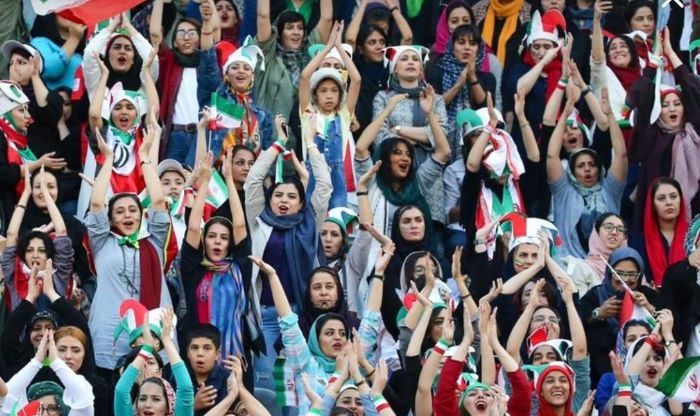~ 8 September 2023 ~
Iran’s National Security Council has decided that female spectators can now attend matches in football stadiums. The policy, dubbed “No Girls Allowed”, has been in place for decades, despite the fact that Iran has hosted a national women’s football team since 1976. Interestingly enough, women and girls were barred from attending sporting events at stadiums, but they were not barred from attending national celebrations or political events at the same stadiums. But it may not even be as simple as that.
Medhi Taj, chairman of the Football Federation Islamic Republic of Iran, delivered the news that the ban was lifted, stating that a task force comprised of the Ministry of the Interior and Sports, the federation, and two security bodies were still considering the details on implementation. Code for the ban could still be implemented.
Reversing Women’s Rights
Women’s rights in Iran were encouraged and supported under Reza Shah, and later by his son, Mohammad Reza Pahlavi, the last Shah of Iran. Following the Islamic Revolution in 1979 and the introduction of Ayatollah Khomeini, there were drastic reversals in the progress of Iranian women and girls’ human rights. An edict was issued, barring female spectators from entrance to stadiums to attend football and sports events. Yet, authorities have enforced something for more than forty years, that is not an actual law or regulation and has no merit, except to discriminate against and control the female population.
Iranian officials argue that the atmosphere of stadiums is not suitable for women and girls because male football fans swear profanities. Even if females are seated in a different part of the stadium, authorities claim it is not appropriate. Another explanation claims that the atmosphere is inappropriate because the games are played by men wearing shorts and women should not see it.
But Khomeini revised the edict in 1987, to permit women to watch televised games from their homes. Keep in mind the men are still wearing shorts. A decade later, in a 1998 World Cup qualifier game, the Iranian team won against Australia. The Iranians were headed to the World Cup for the first time in eighteen years. Thousands took to the streets of Tehran in celebration. Women and men danced in the streets together. The conservative and traditionalists were offended.
In 2005, Tehran hosted a World Cup qualifier match between Iran and Bahrain. More than 5,000 women showed up to the stadium, demanding to be allowed to attend the match. The police admitted 3,000 women, separated in a special section. The remaining women refused to be denied and broke through the barricades and into the stadium. It was the first time women defied the ban. The cleric establishment was outraged by the incident and used it as an excuse to attack the reformist government of then-President Mohammad Khatami.
International Regulations Prohibit Discrimination of Fans
In 2012, Iran hosted the Asian Football Confederation U-16 Championship. International football regulations require that there should be no gender discrimination among fans. Senior Director, Shin Mangil stated, “If Iran wants to host international championships, it has to respect the rules.”
Then President Mahmoud Ahmadinejad said that Iran would adhere to the international football regulations, but the cleric establishment admonished the president and sharply disagreed, claiming that men and women should not mix. It is one more example of the “No Girls Allowed” rule.
For more than a decade, FIFA, the world’s soccer authority, has tried to convince the Islamic Republic to lift the unwritten ban on women attending stadiums to watch male players. FIFA’s position is clear: there cannot be discrimination against spectators. Although they credit Iran with “historic progress”, there is little doubt that FIFA has been relaxed over the years as the Iranian regime has manipulated the international federation by sporadically admitting some women into stadiums, even handpicking who can watch a game, and other times flat out refusing entrance to women.
In 2019, after the deadline FIFA set for Iranian authorities to agree that “women have to be allowed into football stadiums,” the government permitted a limited number of women to attend a World Cup qualifying match at Azadi Stadium. In many instances, the Iranian government has used tactics to restrict the number of women attending a sports match, randomly allowing a limited number of women entrance to the stadiums. But the ban has nevertheless been imposed despite FIFA’s insistence on allowing unrestricted access to stadiums by women.
Woman. Life. Freedom.
The bans have led to arrests, beatings, detentions, and abuses against women. In Sept 2019, Iranian female football fan Sahar Khodayari, known as “The Blue Girl,” died after she self-immolated in front of a court in Tehran. Khodayari was sentenced to two years for attempting to enter a football stadium to watch her team play.
In March 2022 in the city of Mashhad, hundreds of women who had purchased tickets online to watch the World Cup qualifier between the national team and Lebanon were refused entry. The women were tear gassed and pepper sprayed by security forces when they insisted that they had the right to watch the game. Several women were injured in the incident. Fans chanted “The Blue Girl.”
Without apologizing for the violence against the women, Iran’s football federation blamed the violence on “fake” tickets and accused women of lying about their gender to purchase tickets online. Although Iran won the game, qualifying for the World Cup in Qatar, Iranian fans urged FIFA to ban their country from the tournament. The #fifabaniri (FIFA ban Islamic Republic of Iran) and similar hashtags rose to the top on Twitter.
Women and girls in Iran want their fundamental human rights. They want to have the freedom to do something so basic, as to go to a football game and support their team.
For generations, gender inequality has been upheld in Iran. For the time being, Iran claims that it has lifted the “No Girls Allowed” ban. But if history is any indicator in Iran, the government – or the cleric establishment – could reverse itself at any moment, or the government might allow a few thousand women to enter a stadium, just to show FIFA that there is no ban. But until all women are allowed to freely purchase tickets and walk through the stadium gates, without reservation… it is still a ban.
With gratitude… Lara
Photo Credit: Female spectators at Azida Stadium Iran by Maryam Takhtkeshiam. Licensed under CC By 4.0
#thinkingoutloud #tol #larakajs #Iran #womenlifefreedom #nogirlsallowed #FIFA #worldcup #humanrights

